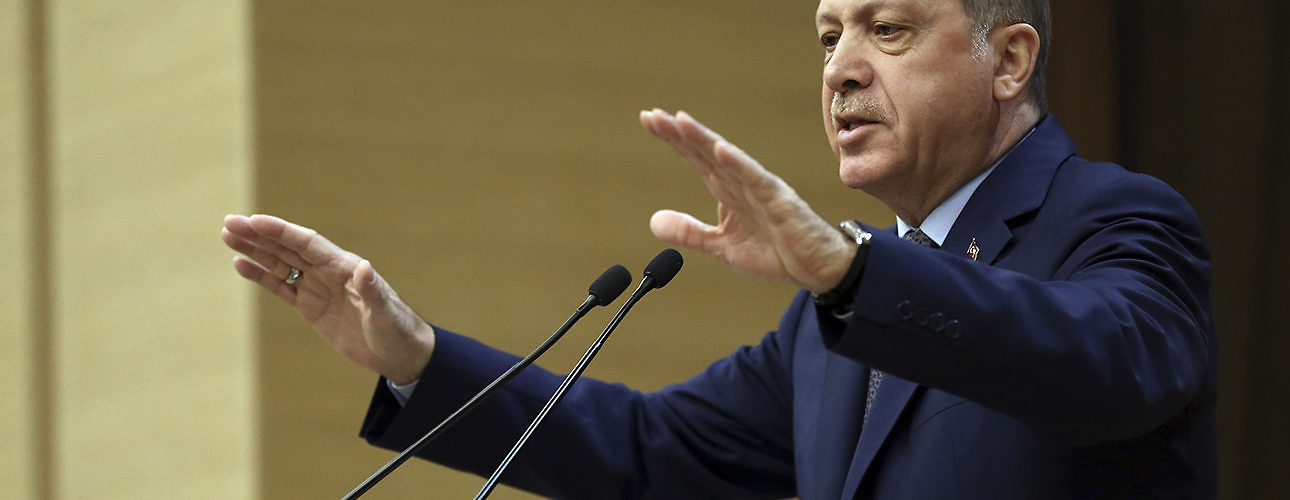Turkey's President Recep Tayyip Erdogan speaks about the ceasefire agreement in Syria. Ankara, Turkey, December 14, 2016. (Murat Cetinmuhurdar/Pool/Associated Press)
For some time, observers have been asking whether Turkey is still a democracy. Some have been trying to redefine the country’s political landscape by employing concepts such as “competitive authoritarianism” or “weak democracy, with some authoritarian leanings.” Yet recent developments, especially since the June 2015 elections, should provide ample evidence that Turkey is now ruled by an authoritarian administration. The only matter that might remain up for debate is whether or not a turn toward a full-blown dictatorial regime is in store.
At the same time, the leaders of European Union nations have faced increasing support for populist politics that could bring about the end of the bloc. These existential concerns have compounded the EU’s fears of losing Turkey as an ally in managing the regional refugee crisis, and had seemed to preclude a determined response toward its neighbor’s new positions.
Yet eventually Brussels did take a stand, adopting a resolution on November 24 to freeze talks on Turkey’s accession to the EU. The immediate reaction from Turkish President Recep Tayyip Erdoğan was to shrug his shoulders and express an interest in building relationships with the Shanghai Cooperation Organisation instead. While the European Parliament has expressed strong discontent with Turkey, the Obama administration in the United States has remained silent. It is also highly unlikely that the incoming Donald Trump administration will be an effective critic of Erdoğan.
Turkey is admittedly no stranger to authoritarianism. Its republican history has been dotted with coups, political party closures, various restrictions on rights and freedoms, and gross human rights violations such as the burning of villages, “disappearances” of individuals, forced resettlement, and torture, especially in its predominantly Kurdish southeastern region. The cautious optimism held by some about the emergence of a strong inclusive democracy during the Justice and Development Party’s (AKP) early term in power (2001-2006) has now completely evaporated.
The most recent marker of Turkey’s downward spiral was the coup attempt of July 15 this year. The human cost of this was huge in itself: Hundreds lost their lives and thousands were injured. The government was swift in declaring a state of emergency, which enabled it to rule by decree, and developments have been trending toward illiberalism ever since.
Since the coup attempt, Ankara singled out the cleric Fethullah Gülen and his followers as culprits and pledged swift action to punish those responsible. Thousands of academics have since been fired or suspended. More than 100,000 civil servants were fired. Hundreds of journalists have been detained and remain, to this day, under arrest. According to some reports, around 170 media outlets have been shut down. Last month, one of the very few remaining opposition media outlets, the long-standing and iconic Cumhuriyet newspaper, also witnessed the heavy hand of the AKP. At the time of writing, 10 journalists, including its editor-in-chief, remain under arrest. In early November, the government also ignored the will of the electorate by arresting the joint leaders of the pro-Kurdish Peoples’ Democratic Party, along with nine members of parliament.
The government’s actions are aggressively geared toward paving the way for the more powerful regime envisioned by Erdoğan. The president not only has the media and state institutions on his side but recently seems to have secured an alliance with the radical right-wing Nationalist Action Party (MHP) over reinstating the death penalty. This alliance has also signaled the further hardening of the president’s approach to the Kurdish issue.
These developments have significant consequences for re-establishing social order in the country. In particular, the suppression of venues for legitimate political participation has immediate and irreversible consequences for the way Kurdish citizens view their future inside Turkey. Generations that have grown up knowing nothing but conflict are now coming to consider the ballot box as unlikely to change anything. Taking a political solution out of the equation would only further the psychological alienation of Kurdish citizens and possibly contribute to further radicalization.
Domestically, the building of an effective opposition inside the political domain is essential to stop the further strengthening of one-party, one-person rule. Yet such opposition is lacking, and its realization does not seem plausible for the foreseeable future. At the moment, the immediate struggle inside parliament is over a draft constitution proposed by the AKP and supported by the MHP, which seeks change from a republican to a presidential system. Under this, the president’s powers will be expanded to also include significant legislative capacities. By moving away from the notion of separation of powers, and by minimizing the checks and balances inside the system, the new constitution could effectively establish fully authoritarian, and even dictatorial, rule.
Should, and could, external actors do anything meaningful while Erdoğan declares that hearing himself labelled a dictator by Western media goes “in one ear, out the other”? The Trump administration, for one, seems unlikely to compel Turkey to comply with its international obligations and tackle its democratic deficits in a consistent and meaningful manner.
The EU, on the other hand, could continue to apply pressure, particularly by playing the economic card. Turkey and the bloc have been significant trading partners since 1995, which gives Brussels the opportunity to make life very difficult for Erdoğan, especially since the success of the AKP depends partly on its improvement of the economy.
The West will be unlikely to find an authoritarian Turkey a reliable partner in its region. Continuation on its current path could contribute to diminished peace and stability. Rising authoritarianism, erratic responses to international developments, and, more recently, revisionist fantasies and sectarian politics in Iraq and Syria, should prompt a resolute and effective response against Erdoğan.
Yesim Bayar is Assistant Professor of Sociology and Anthropology at Concordia University, Montreal.





